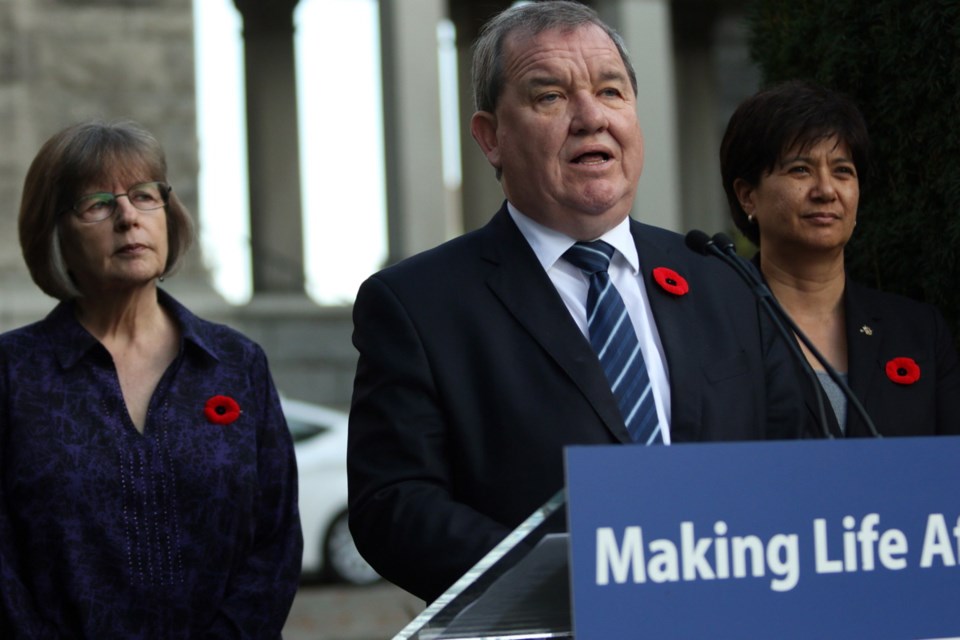 B.C. MLAs are in the second week of an increasingly bitter argument about a wage differential the NDP is establishing in the social-services network.
B.C. MLAs are in the second week of an increasingly bitter argument about a wage differential the NDP is establishing in the social-services network.
A funding plan for the fiscal year just starting gives unionized workers in the sprawling care network a considerably bigger raise than the one scheduled for the non-union people. In blended agencies, the two classes of employees, the vast majority of them women, often work side-by-side, doing the same jobs. They work in day cares, home care, crisis lines, social housing, treatment services, counselling, immigrant settlement, special-needs support and other fields.
Advocates in the sector are deeply unhappy about the unfairness. They organized a small demonstration this month on the steps of the legislature. That prompted questions in the house that have persisted.
So far, there have been no coherent answers from NDP cabinet ministers about the policy. The issue is complicated by the bizarro world MLAs currently inhabit. Opposition B.C. Liberals short-changed the sector several times during lean budget years, and are now purporting to ride to the rescue of the same people they stiffed. New Democrats spent those same years objecting to all that mistreatment, but now look to be heading down the same road.
So the matching histories of the two now-reversed sides are being recounted to the point that they’re dominating the argument. Cabinet ministers have dodged almost every question by reaching back into history and pointing out the Liberal track record from years gone by.
The cabinet’s answers include extended-play reminders that the Liberals tore up contracts, diminished the value of workers, slashed the community-living budget and rolled back wages.
“The litany of unfair treatment of the service providers by that side is 16 years long,” said Social Development Minister Shane Simpson.
Actually, it will be 17 and counting if the policy stands.
Funding has been established to cover two per cent raises for the next three years that were negotiated. Non-unionized workers will get a similar increase.
But additional special funding for “low-wage redress” is available to cover only the unionized staff. The raises that money will provide will vary widely throughout the sector, but average about four per cent a year.
That leaves about 17,000 non-union workers behind, which is roughly half the people in the overall sector. It will be a $4-an-hour gap in some agencies by the end of three years.
The policy for the past dozen years has been to match non-union wage hikes to union-negotiated raises. But that has apparently been shelved.
Leaders in the field are warning the gap will have widespread, damaging implications.
Simply unionizing would restore parity. But the field is so complicated and intertwined that it’s not an option for everyone or every agency.
What’s more likely is that workers will quit the lower-paying jobs and move to the higher-paid ones, leaving some agencies in deep trouble. It could also create chaos in some outfits where union and non-union staff work closely together at the same jobs.
The NDP has budgeted big increases in targeted areas to provide more and better social services. So the overall sphere will likely grow, but so will the festering problem they have created with the institutionalized wage gap.
It’s not just opposition Liberals who aren’t getting answers. The government has ignored a couple of letters from leaders in the field warning them about the problem. And the convoluted official communiqué that confirms the differential came after some verbal reassurances that the existing policy was unlikely to be changed.
The lack of answers is starting to wear thin.
Opposition Leader Andrew Wilkinson said Tuesday: “Across the way, they stare into their laps. They play with their gadgets on the table. They’re not sure what to say, because this is a flagrant example of discrimination.”
And NDP resentment about being grilled by people with a spotty record in the field is also on display.
After Wilkinson pictured Simpson meeting workers in his riding and hanging his head in shame, Simpson said he’d be happy to take the stroll. “Then he can take me to the West Vancouver Yacht Club for tea afterwards.”



